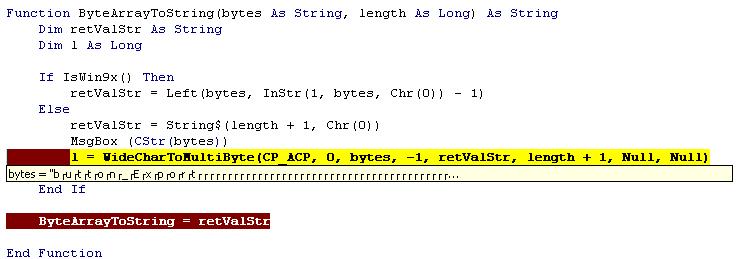2
Dies ist ein Code-Schnipsel.So erhalten Sie eine Zeichenfolge aus der Ausgabe von ReadProcessMemory
Declare Function ReadProcessMemory Lib "kernel32" _
(ByVal hProcess As Long, _
ByVal lpBaseAddress As Long, _
lpBuffer As Any, _
ByVal nSize As Long, _
lpNumberOfBytesRead As Long) As Long
Dim bytearray As String * 65526
Dim GetWindowsFormsID
ReadProcessMemory(processHandle, bufferMem, ByVal bytearray, size, lp)
GetWindowsFormsID = ByteArrayToString(bytearray, retLength)
Function ByteArrayToString(bytes As String, length As Long) As String
Dim retValStr As String
Dim l As Long
retValStr = String$(length + 1, Chr(0))
l = WideCharToMultiByte(CP_ACP, 0, bytes, -1, retValStr, length + 1, Null, Null)
ByteArrayToString = retValStr
End Function
Ich habe '94 null‘Fehler beim WideCharToMultiByte aufrufen. Aber ich bin sicher, Bytes ist nicht leer.

Ist dies der genaue Ablauf dieser Ausgabe in String zu konvertieren?